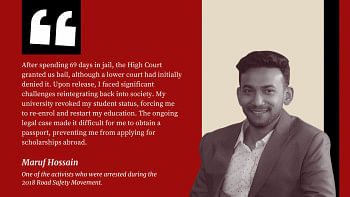Compensation mechanism for road crashes still unclear

Though the Road Transport Act, 2018 has been a significant step forward, its implementation has faced numerous challenges. A key issue is that many sections of the law were omitted due to pressure from transport owners' organisations. A pertinent question is whether those sections should now be reinstated.
Bangladesh's efforts in road safety legislation date back to 1983, eventually leading to the 2018 act. When drafting the law, the primary focus was on addressing unsafe road conditions, with particular attention to the drivers' working hours, role of assistants, and allocation of responsibilities in road management and accidents.
Challenges in implementation have persisted. Although the law has been passed, many of its provisions have yet to be properly enforced. Before this law, road crashes and casualties were alarmingly high, and even after the law was passed, these numbers remain significantly high. While there is no definitive research to prove this, observations suggest that the situation on the roads has not fundamentally improved.
Another critical issue is the matter of compensation for road crash victims. The act mentions a trust fund for victims, but it took four years after its passing for the fund to be set up. In the interim, no financial assistance was available to road crash victims, leading to legal battles and delays. The law does stipulate financial aid in specific cases, but the mechanisms for calculating and distributing compensations are unclear. There is no system in place to determine the compensation amounts based on the extent of damage or injury. Compensation in the event of death is mentioned, but the law fails to specify appropriate amounts, and in many cases, the sums offered seem arbitrary and unfair. There is a significant gap in how compensations are handled, leaving the victims and their families without proper recourse.
Previously, victims could file lawsuits to seek compensation, but this option is no longer available, creating a legal void. Even after the creation of the trust fund, victims continue to face obstacles in obtaining compensation. For example, in a recent case, a victim's application for compensation was not accepted, indicating that the system remains flawed and difficult to navigate.
Given these challenges, the question of reinstating the sections of the law omitted previously should be seriously considered. However, such a decision is beyond the scope of committees alone. As citizens, it is imperative to raise these demands with the government. Relying solely on the current system is not enough; more must be done to ensure the proper implementation of the law and accountability for the safety and well-being of all road users.
Md Borkot Ali is director (legal) at Bangladesh Legal Aid and Services Trust (BLAST) and an advocate at the Supreme Court of Bangladesh.
Views expressed in this article are the author's own.
Follow The Daily Star Opinion on Facebook for the latest opinions, commentaries and analyses by experts and professionals. To contribute your article or letter to The Daily Star Opinion, see our guidelines for submission.


 For all latest news, follow The Daily Star's Google News channel.
For all latest news, follow The Daily Star's Google News channel. 









Comments